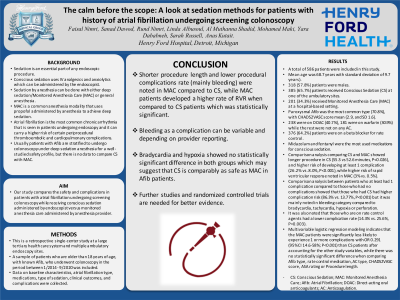Tuesday Poster Session
Category: General Endoscopy
P3408 - The Calm Before the Scope: A Look at Sedation Methods for Patients with History of Atrial Fibrillation Undergoing Screening Colonoscopy
Tuesday, October 24, 2023
10:30 AM - 4:00 PM PT
Location: Exhibit Hall

Has Audio

Faisal M. Nimri, MD
Henry Ford Hospital
Detroit, MI
Presenting Author(s)
Faisal M. Nimri, MD1, Sanad Dawod, MD1, Rund Nimri, 2, Linda Albusoul, 1, Al Muthanna Shadid, MD1, Mohamed Maki, MBBCh1, Yara Dababneh, MD1, Sarah Russell, MD1, Anas Kutait, MD1
1Henry Ford Hospital, Detroit, MI; 2Jordan University of Science and Technology, Irbid, Irbid, Jordan
Introduction: Anesthesia/Sedation is an essential part of any endoscopic procedure. Main sedation types used in endoscopy are Conscious Sedation (CS) which uses IV analgesics & anxiolytic & can be given by the endoscopist or Deep sedation (General Anesthesia or Moderate Anesthesia Care (MAC)). MAC uses propofol administered by anesthesia team to achieve deep sedation. Afib is the most common chronic arrhythmia that is seen in patients undergoing endoscopy and can carry a higher risk of certain periprocedural cardiopulmonary complications.
Methods: This is a retrospective single-center study at a tertiary hospital and multiple affiliated ambulatory endoscopy sites. A sample of patients older than 18 years, has Afib, & had colonoscopy between 1/2014 - 9/2020 was included. Data on baseline characteristics, Afib type, medications, sedation type, clinical outcomes, & complications were collected.
Results: A total 586 patients were included (mean 68.7 years, SD 9.7 years), of which 318 (57.8%) were males. 385 (65.7%) patients received CS at one of the ambulatory sites, and 201 (34.3%) received MAC at a hospital-based setting. Paroxysmal Afib was the most common type (70.8%), with CHADS2VASC score mean (2.9, SD 1.6). 238 were on DOAC (40.7%), 181 were on warfarin (30.9%). 376 (64.2%) patients were on beta blockers for rate control. Comparison analysis comparing CS and MAC showed longer sedation time in CS (55.3 vs 52.6 minutes, P< 0.026), while a higher risk of RVR noted in MAC (3% vs. 0.5%; P=0.022), but comparing bradycardia and hypoxia showed no statistically significant difference between CS & MAC (P=0.059, P=1.00) respectively. Also noted that those who are rate controlled had lower complication rates (14.3% vs. 25.6%, P=0.003). Multivariable logistic regression modeling indicates that the MAC and CS showed no statistically significant complications after accounting for the other study variables including age, sex, Afib type, anticoagulation use or type, rate control medications, CHADS2VASC score, ASA rating.
Discussion: In our study, patient with Afib who underwent screening colonoscopy with CS versus MAC showed comparable cardiopulomnary safety profile if not safer. There was no statistically significant risk for hypoxia and bradycardia, while MAC showed higher risk for RVR (tachycardia) compared to CS. Longer sedation time in CS compared to MAC are likely related to induction time. Larger scale randomized controlled trial needed to study safety CS compared to MAC in Afib patients undergoing endoscopy.

Disclosures:
Faisal M. Nimri, MD1, Sanad Dawod, MD1, Rund Nimri, 2, Linda Albusoul, 1, Al Muthanna Shadid, MD1, Mohamed Maki, MBBCh1, Yara Dababneh, MD1, Sarah Russell, MD1, Anas Kutait, MD1. P3408 - The Calm Before the Scope: A Look at Sedation Methods for Patients with History of Atrial Fibrillation Undergoing Screening Colonoscopy, ACG 2023 Annual Scientific Meeting Abstracts. Vancouver, BC, Canada: American College of Gastroenterology.
1Henry Ford Hospital, Detroit, MI; 2Jordan University of Science and Technology, Irbid, Irbid, Jordan
Introduction: Anesthesia/Sedation is an essential part of any endoscopic procedure. Main sedation types used in endoscopy are Conscious Sedation (CS) which uses IV analgesics & anxiolytic & can be given by the endoscopist or Deep sedation (General Anesthesia or Moderate Anesthesia Care (MAC)). MAC uses propofol administered by anesthesia team to achieve deep sedation. Afib is the most common chronic arrhythmia that is seen in patients undergoing endoscopy and can carry a higher risk of certain periprocedural cardiopulmonary complications.
Methods: This is a retrospective single-center study at a tertiary hospital and multiple affiliated ambulatory endoscopy sites. A sample of patients older than 18 years, has Afib, & had colonoscopy between 1/2014 - 9/2020 was included. Data on baseline characteristics, Afib type, medications, sedation type, clinical outcomes, & complications were collected.
Results: A total 586 patients were included (mean 68.7 years, SD 9.7 years), of which 318 (57.8%) were males. 385 (65.7%) patients received CS at one of the ambulatory sites, and 201 (34.3%) received MAC at a hospital-based setting. Paroxysmal Afib was the most common type (70.8%), with CHADS2VASC score mean (2.9, SD 1.6). 238 were on DOAC (40.7%), 181 were on warfarin (30.9%). 376 (64.2%) patients were on beta blockers for rate control. Comparison analysis comparing CS and MAC showed longer sedation time in CS (55.3 vs 52.6 minutes, P< 0.026), while a higher risk of RVR noted in MAC (3% vs. 0.5%; P=0.022), but comparing bradycardia and hypoxia showed no statistically significant difference between CS & MAC (P=0.059, P=1.00) respectively. Also noted that those who are rate controlled had lower complication rates (14.3% vs. 25.6%, P=0.003). Multivariable logistic regression modeling indicates that the MAC and CS showed no statistically significant complications after accounting for the other study variables including age, sex, Afib type, anticoagulation use or type, rate control medications, CHADS2VASC score, ASA rating.
Discussion: In our study, patient with Afib who underwent screening colonoscopy with CS versus MAC showed comparable cardiopulomnary safety profile if not safer. There was no statistically significant risk for hypoxia and bradycardia, while MAC showed higher risk for RVR (tachycardia) compared to CS. Longer sedation time in CS compared to MAC are likely related to induction time. Larger scale randomized controlled trial needed to study safety CS compared to MAC in Afib patients undergoing endoscopy.

Figure: Multivariable Logistic Regression Result for Predicting the Presence of at least 1 Complication While Presenting the Individual Results for Anticoagulation and Drug Control
Disclosures:
Faisal Nimri indicated no relevant financial relationships.
Sanad Dawod indicated no relevant financial relationships.
Rund Nimri indicated no relevant financial relationships.
Linda Albusoul indicated no relevant financial relationships.
Al Muthanna Shadid indicated no relevant financial relationships.
Mohamed Maki indicated no relevant financial relationships.
Yara Dababneh indicated no relevant financial relationships.
Sarah Russell indicated no relevant financial relationships.
Anas Kutait indicated no relevant financial relationships.
Faisal M. Nimri, MD1, Sanad Dawod, MD1, Rund Nimri, 2, Linda Albusoul, 1, Al Muthanna Shadid, MD1, Mohamed Maki, MBBCh1, Yara Dababneh, MD1, Sarah Russell, MD1, Anas Kutait, MD1. P3408 - The Calm Before the Scope: A Look at Sedation Methods for Patients with History of Atrial Fibrillation Undergoing Screening Colonoscopy, ACG 2023 Annual Scientific Meeting Abstracts. Vancouver, BC, Canada: American College of Gastroenterology.
